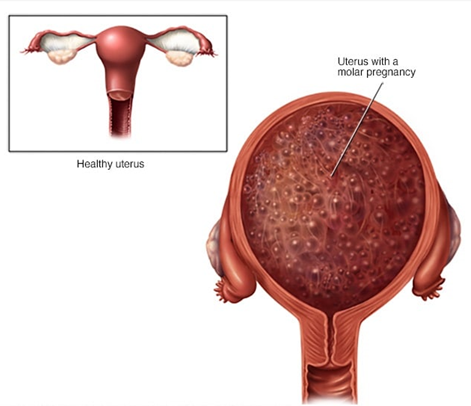A nurse is teaching a client who is at 15 weeks of gestation and is to undergo an amniocentesis. The nurse should explain that the purpose of this test is to identify which of the following conditions? (Select all that apply.)
Rh incompatibility
Fetal gender
Cephalopelvic disproportion
Anomalies in fetal chromosomes
Neural tube defects
Correct Answer : B,D,E
Explanation:
A. Rh incompatibility
Amniocentesis is not used to identify Rh incompatibility. Rh incompatibility occurs when the mother is Rh-negative, and the baby is Rh-positive, leading to potential complications if the mother develops antibodies against the baby's Rh-positive blood cells. However, this condition is typically managed through other means such as Rh immunoglobulin (RhIg) administration.
B. Fetal gender
Amniocentesis can determine the fetal gender by analyzing the chromosomes present in the fetal cells obtained from the amniotic fluid. The presence of a Y chromosome indicates a male fetus, while its absence indicates a female fetus. Therefore, fetal gender can be identified through amniocentesis.
C. Cephalopelvic disproportion
Cephalopelvic disproportion refers to a situation where the baby's head is too large to pass through the mother's pelvis during childbirth. This condition is typically diagnosed during labor based on the progress of labor and fetal descent. Amniocentesis is not used to identify cephalopelvic disproportion.
D. Anomalies in fetal chromosomes
Amniocentesis is primarily used to identify anomalies in fetal chromosomes, such as chromosomal abnormalities like Down syndrome (Trisomy 21), Trisomy 18, and Trisomy 13. It can also detect other chromosomal abnormalities and genetic disorders caused by changes in the number or structure of chromosomes.
E. Neural tube defects
Amniocentesis can detect neural tube defects, such as spina bifida and anencephaly, by analyzing levels of alpha-fetoprotein (AFP) and other markers in the amniotic fluid. Elevated levels of AFP may indicate a neural tube defect.
Nursing Test Bank
Naxlex Comprehensive Predictor Exams
Related Questions
Correct Answer is A
Explanation
Explanation:
A. A client who is at 38 weeks of gestation and reports a cough and fever.
The client at 38 weeks of gestation with a cough and fever presents with symptoms that could indicate a potential infection, such as respiratory or urinary tract infection, which can be serious during pregnancy. Infections in late pregnancy can also increase the risk of complications for both the mother and the baby. Therefore, assessing this client first is crucial to evaluate and address any potential infection and prevent complications.
B. A client who is at 28 weeks of gestation and reports painless vaginal bleeding.
Painless vaginal bleeding can be a concern, especially in the second or third trimester, as it may indicate conditions such as placenta previa or placental abruption. However, since this client's bleeding is painless, it may not be an immediate emergency compared to the potential infection in option A.
C. A client who is at 14 weeks of gestation and reports nausea and vomiting.
Nausea and vomiting, commonly known as morning sickness, are common during early pregnancy. While these symptoms can be uncomfortable, they are typically not urgent unless they lead to dehydration or other complications, which would require assessment but may not be as urgent as a potential infection in option A.
D. A client who has missed a period and reports vaginal spotting.
Vaginal spotting can occur in early pregnancy and may or may not be concerning depending on the amount and frequency. Since this client has missed a period, it suggests early pregnancy, and spotting can be relatively common in early pregnancy without indicating a significant problem. However, assessment is still needed to rule out any potential complications.
Correct Answer is A
Explanation
Explanation:
A. Excessive uterine enlargement
This choice is correct because a hydatidiform mole can cause rapid and excessive growth of the uterus due to the abnormal proliferation of placental tissue. This can lead to the uterus being larger than expected for the gestational age.

B. Profuse, clear vaginal discharge
This choice is not typically associated with a hydatidiform mole. While vaginal discharge can occur during pregnancy, a profuse and clear discharge is not specifically characteristic of a hydatidiform mole. Other causes, such as normal vaginal secretions or infections, could lead to such discharge.
C. Rapid decline in human chorionic gonadotropin (hCG) levels
This choice is not typical of a hydatidiform mole. In fact, one of the hallmarks of a molar pregnancy is an abnormally high level of hCG. The hCG levels may continue to rise instead of declining rapidly.
D. Irregular fetal heart rate
This choice is not associated with a hydatidiform mole because a molar pregnancy does not involve a viable fetus with a heartbeat. Instead, it is characterized by the abnormal growth of placental tissue, which can cause symptoms related to uterine enlargement and complications such as bleeding or preeclampsia, but not an irregular fetal heart rate.
Whether you are a student looking to ace your exams or a practicing nurse seeking to enhance your expertise , our nursing education contents will empower you with the confidence and competence to make a difference in the lives of patients and become a respected leader in the healthcare field.
Visit Naxlex, invest in your future and unlock endless possibilities with our unparalleled nursing education contents today
Report Wrong Answer on the Current Question
Do you disagree with the answer? If yes, what is your expected answer? Explain.
Kindly be descriptive with the issue you are facing.
